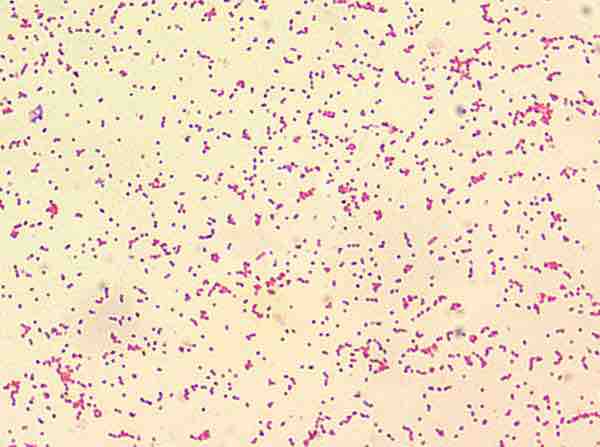Brucellosis, also called Bang's disease, Crimean fever, Gibraltar fever, Malta fever, Maltese fever, Mediterranean fever, rock fever, or undulant fever, is a highly-contagious zoonosis caused by ingestion of unsterilized milk or meat from infected animals or close contact with their secretions. Transmission from human to human, through sexual contact or from mother to child, is rare but possible .

Brucella bacteria
Brucella spp. are poorly staining, small gram-negative coccobacilli.
Brucella spp. are small, gram-negative, non-motile, non-spore-forming, rod-shaped (coccobacilli) bacteria. They function as facultative intracellular parasites causing chronic disease, which usually persists for life. Symptoms include profuse sweating, and joint and muscle pain.
Species infecting domestic livestock are B. melitensis (goats and sheep), B. suis (pigs), B. abortus (cattle), B. ovis (sheep), and B. canis (dogs). B. abortus also infects bison and elk in North America and B. suis is endemic in caribou. Brucella species have also been isolated from several marine mammal species (pinnipeds and cetaceans).
Brucellosis in humans is usually associated with the consumption of unpasteurized milk and soft cheeses made from the milk of infected animals, primarily goats, infected with Brucella melitensis, as well as with occupational exposure of laboratory workers, veterinarians, and slaughterhouse workers. Some vaccines used in livestock, most notably B. abortus strain 19, also cause disease in humans if accidentally injected.
Brucellosis induces inconstant fevers, sweating, weakness, anaemia, headaches, depression, and muscular and bodily pain. The symptoms are like those associated with many other febrile diseases, but with emphasis on muscular pain and sweating.
The duration of the disease can vary from a few weeks to many months or even years. In the first stage of the disease, septicemia occurs and leads to the classic triad of undulant fevers, sweating (often with characteristic smell, likened to wet hay), and migratory arthralgia and myalgia.
Antibiotics like tetracyclines, rifampicin, and the aminoglycosides streptomycin and gentamicin are effective against Brucella bacteria. However, the use of more than one antibiotic is needed for several weeks, because the bacteria incubate within cells.